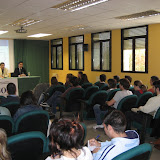How far should a public administration go with regard to the provision of value—added services based on open data?
Note: This article is a translation of what I wrote in Spanish for the International Open Data Conference 2016 blog. You can read the original post in spanish: ¿Hasta dónde debe llegar la administración en la prestación de servicios sobre datos abiertos? and in english: How far should a public administration go with regard to the provision of value—added services based on open data?Last Monday I took part in the panel “Reuse of EU open data: challenges and opportunities” during the Reuse of EU legal data Workshop, organized by the Publications Office of the European Union. One of the interesting issues that came up during the panel (you can watch it here) focused on the well-known question: How far should a public administration go with regard to the provision of services based on open government datasets?
The discussion in the context of fostering open government data reuse, arise from the difficulties of finding a balance between the services that every public administration must provide to citizens for free and the space that should be left for private initiatives to create value from open government datasets. In many cases, that unstable balance creates certain tensions that do not contribute to innovation.
In the past few years, I have heard numerous arguments both from the supply and the demand side. These arguments show positions from one end: “public administrations should only provide raw data and no services;” to the opposite: “the public administration should go forward in the value chain as much as possible when providing services to citizens.”
My position in this matter, which I had the chance to defend during the debate, is that it is not useful to work in drawing a red line between what should be considered a basic/core service and a premium/value-added service. Quite on the contrary, we should work on the definition of the minimum incentives that should be designed for opendata-driven innovation to flourish and deliver wealth creation.
 |
| Photo by: Rodion Kutsaev |
For that reason, I used the panel to make the following statement, which could be a starting point to clearly define the minimum conditions that a reuser needs to create value added services:
“open government datasets should be released in such condition that a reuser can build the same services that are provided for free by the data holder.”
This is basically because, in many cases, value creation starts from that baseline; this is, from just improving a service that already exists. If an existing public service cannot be reproduced, for example due to a few hours delay in the release of the underlying dataset or because of the limited quality of the released data, then it will not be possible to innovate by launching and improved product or service to the market.
In my opinion, this approach to the issue can help us make some progress in this debate. I hope this first statement can be improved and better worded by contributions from the community, or otherwise proved wrong by evidence or better arguments than my own.








No hay comentarios:
Publicar un comentario